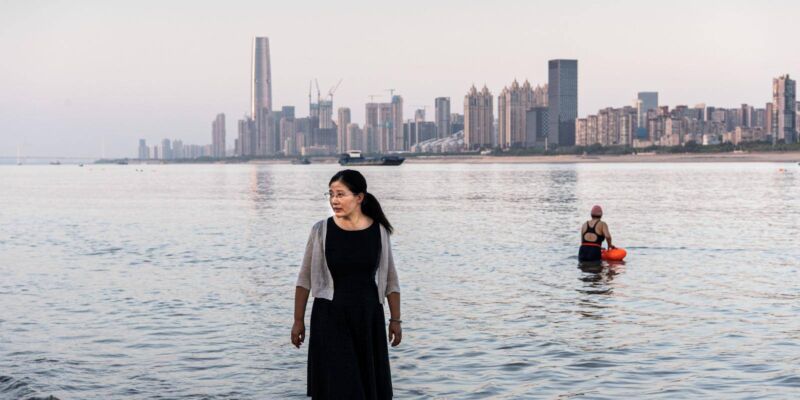
Since joining the World Trade Organization (WTO) in 2001, China has regularly unveiled a grand new strategic concept every four years or so.
Each has been deeply rooted in the Chinese political system and communicated via ambitious slogans, such as A Harmonious World, or New Types of Great Power Relations. And all have reliably generated both excitement and confusion abroad and within China.
China’s latest grand concept, the Global Development Initiative (GDI), is no exception. When Chinese president Xi Jinping introduced it at the United Nations General Assembly (UNGA) in September 2021, it made hardly any splash in the West, perhaps because China has already signalled its determination to shape international development in the post-COVID era.
But the GDI is more than just a new label for an ongoing project. One of its core political functions is to deflect some of the fierce criticism directed at its older sibling, the gigantic Belt and Road Initiative (BRI), which has a tarnished reputation for being neither transparent nor sufficiently ‘green’.
Focus on grants and capacity-building
According to the Chinese government’s initial description of the GDI, sustainability is a key feature of the programme. Unlike the BRI, the GDI will focus less on physical infrastructure projects – such as roads, bridges, digital networks, and coal-fired power plants – and more on sustainable-development grants and capacity-building.
In his remarks about GDI in 2021, Xi placed special emphasis on advancing the UN Sustainable Development Goals (SDGs) and helping developing countries manage the transition to a low-carbon economy.
On paper, then, the GDI appears a laudable initiative. While ongoing geopolitical tensions have deepened divisions between China and the US, derailing collaboration on combatting climate change, China at least is adjusting its diplomacy and aid programmes to position itself as a more attractive partner for those seeking climate security.
Since launching the GDI, it has already created the China-Pacific Island Countries Climate Action Cooperation Centre to help some of the world’s most vulnerable countries mitigate the damage from climate change.
But the GDI is still very much in line with China’s past grand initiatives. Its implementation is opaque and there is considerable flexibility in how it will deliver projects and offer grants. This approach is well understood and frequently practiced by Chinese political elites, following Deng Xiaoping’s famous reform ethos of ‘crossing the river by feeling the stones’.
Xi has clearly adopted this approach in introducing the GDI. But whereas Deng was steering China’s domestic economy during a period of isolation after the Cultural Revolution, Xi needs to involve many other countries in his vision. That will not be easy now that Russia’s war in Ukraine and other recent developments have complicated many of China’s international relationships.
China’s leaders recognize the BRI was not warmly received in global development circles, owing partly to its role in increasing both climate and financial risks. In implementing the GDI, they need to rethink some basic assumptions. Although gigantic infrastructure investments drove China’s own economic miracle, the same approach is not necessarily applicable everywhere.
Nor should China’s development aid be relentlessly used to seek diplomatic endorsement from other countries. Instead, producing a clear, concrete action plan with specific regional and thematic points of focus would enhance the GDI’s clarity and credibility.
Consider Xi’s recent pledge to add $1 billion to the $3.1 billion South-South Cooperation Assistance Fund, which will be renamed the Global Development and South-South Cooperation Fund. If China is serious about the GDI’s green credentials, this money should go towards supporting the clean-energy transition in response to the current oil and gas price crunch.
But the GDI’s success ultimately depends on how China deploys not just financial but political capital. It needs to show it can cooperate constructively with countries in the ‘GDI Friends Group’ launched at the UN in January 2022.
For many group members, the pandemic showed that existing development assistance programs urgently need to be updated to account for their recipients’ specific interests and priorities. After years of hollow diplomatic rhetoric, there is a craving for more meaningful assistance to help countries build resilience against climate-driven natural disasters and other growing threats.
China could help meet this demand, but it also will need to manage expectations. Many in the Global South assume a grand-concept policy such as the GDI will be meticulously planned from within Xi’s cabinet and thus executed to deliver large-scale, rapid results. But the GDI will require broad coordination across a wide range of ministries, agencies, and state-owned banks.
One party but not one voice
China may be ruled by one party, but that doesn’t mean its central administration system can always speak with one voice in supporting sustainable development abroad.
Since launching the BRI in 2013, China has showered the Global South with hundreds of billions of dollars in physical infrastructure investment. With the global climate debate increasingly focusing on the need to mobilize international financing for climate mitigation and adaptation in low and middle-income countries, many will be looking to both China and the advanced economies to provide the necessary support.
But now China is experiencing a domestic economic slowdown, the spending spree of the past decade must come to an end. China no longer has the desire or the means to keep splurging on international initiatives by running down its own foreign-exchange reserves. It has to do more with less, paying closer attention to what other countries desire and fear in their interactions with it.
Actions speak louder than slogans, so Chinese leaders need to focus on delivering high-quality projects with real benefits to GDI recipients, merely forming a Friends Group and issuing new promises is not enough. China must prove it cares about sustainable development and the developing world’s future in a warming world – not just its own global influence.
Dr Yu Jie, Senior Research Fellow on China, Asia-Pacific Programme. This article was originally published by Project Syndicate.
